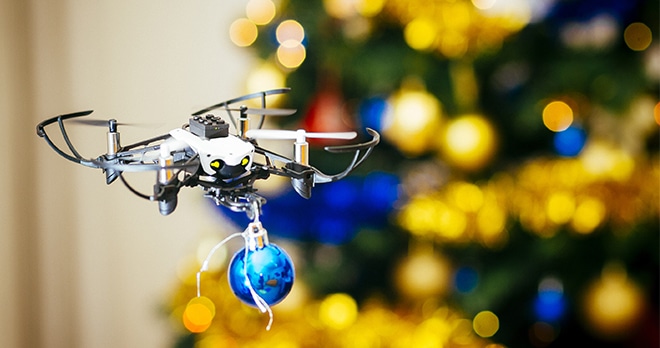Getting a drone for Christmas? A few rules for a flying start

These days, drones are very easy and relatively cheap to get. A great gift! However, a lack of knowledge as to the regulations which surround airborne drone use has the potential to lead the unwary user into difficulties. Add alcohol to the mix and the recipe for disaster is complete!
Is the use of drones regulated?
Yes it is, by the UK Civil Aviation Authority. There are even criminal sanctions possible if drones are misused. Much of the current regulation restricts use within urban areas, and within certain distances from other people and property, particularly if your drone is fitted with a camera, which means that popping out to the back garden for a "test flight" could well result in an offence being committed.
Also, if you are not an experienced drone user, the chances are that you might lose control of the drone and/or let it fly beyond your line of sight, both of which could result in criminal sanction as both of these eventualities have the capacity to cause serious risk of harm to others.
I can fly a drone as soon as I get one, right?
Actually, wrong.
Since 30 November 2019, you need to do three things before your new drone is airborne:
1. If your drone weighs between 250g and 20kg (which encompasses most models), register as an operator with the CAA. When you register, you'll get an operator ID with your certificate of registration. You must display your operator ID on your drones; and if you own more than one, you can use the same operator ID for all your drones. The minimum age requirement for a drone operator is 18; the registration fee is £9, and it must be renewed annually.
2. Pass an online theory test on flying safely and legally.
You will need to study the new Drone and Model Aircraft Code before you take the test. You can take the test as many times as you need. The test has 20 multiple choice questions and the pass mark is 16.
The test is free, but you will need to take it every 3 years to keep your flyer ID current. There is no minimum age requirement, but children under 13 can only register with a parent or guardian present.
When you pass the test, you'll get a flyer ID, which acts as your acknowledgement of competency as a remote pilot from the CAA.
3. Label any drones and model aircraft you're responsible for with your operator ID. This way, CAA will be able to track down your drones and return it to you if it gets lost. This regulator's new "drones reunited" service came after a quarter of pilots admitted losing their devices mid-flight in a CAA study, with half going missing due to battery loss, poor signal or technical faults.
What's behind these measures?
There is a serious message here. Drones are amazing things and make great presents, but they are far from being toys and have the capacity to be extremely dangerous in the wrong hands and, analogous with fireworks on 5 November, need to be treated with a high degree of care and respect. With a small amount of care and circumspection, and in particular resisting the temptation to launch into your maiden flight whilst under the influence or without first having satisfied yourself that you are operating your favourite gift in a safe and responsible manner, you should reach New Year without falling foul of the law, or without incurring the wrath of your neighbours.
The British Airline Pilots Association, a trade union for UK pilots, welcomed the new rules saying they were "desperately needed to ensure a collision between an aircraft and a drone is avoided".
CAA said it expects that 90,000 people will be required to register as drone operators under the new rules. If you are one of them, stick with these ground rules before getting your drone off the ground - and happy flights!
If you're interested in drones, and how the law applies to them, why not listen to our Ahead of the Curve podcast episode with Philip Banks-Welsh: